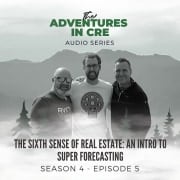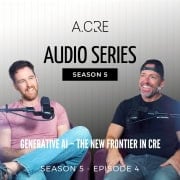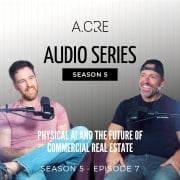Building a Winning CRE Strategy & Team | S4E8
In this episode of the A.CRE Audio series, Sam, Michael, and Spencer talk about the role that a CRE team plays in different real estate strategies. Michael’s current work at Firm Ridge lays the foundation for the conversation and allows Michael to share his experience with how a well-assembled team is important. In this conversation, the guys cover topics such as entitlements, local expertise, contractors, and more.
Watch, listen, or read this episode for a comprehensive understanding of how assembling the right CRE team contributes to success in real estate strategies.
Building a Winning CRE Strategy & Team
Or Listen to this Episode
Resources from this Episode
Episode Transcript
Sam Carlson (00:00):
All right. So it is said, fellows, in case you didn’t know, that teamwork makes the dream work. You ever heard of that? Sure you have. Let’s continue this conversation about Deer Park. But before we do, building a team, that’s a big part of making any strategy work. Spencer, let’s start with you, and then maybe we can pepper Michael about his team that he’s building for the RV strategy.
Spencer Burton (00:23):
Yeah, I mean, there’s a classic business book, Good to Great, and he talks about the importance of having the right people on the bus, the right people on the team. I mean, I think any successful real estate strategy requires an exceptional team that’s tailor-made for that team.
(00:42):
And so in the context of what Michael’s doing, we thought we can dig into your team a bit more. Who you brought onto the team, why you did, what role they play, and why that’s important to filling out the needs of the strategy. So it starts with you.
Michael Belasco (01:00):
Yeah.
Spencer Burton (01:00):
Right?
Michael Belasco (01:00):
Yeah, it’s me.
Spencer Burton (01:02):
Your firm is Firm Ridge. You’re a development firm. Who’s on your team? What roles do they play? And then we can go from there.
Michael Belasco (01:16):
So this CRE team, and as you guys know, this team was curated and developed. Well, actually, this team was curated and developed through many people that you guys actually know, and came through recommendations. It’s just relationships that I’ve cultivated with you guys.
(01:32):
So as a development shop, there’s critical roles that you need. And first and foremost, if you’re developing raw land, is you need an entitlements expert. Now, you can go and do that yourself and you can learn and dig in the weeds, but if you have somebody that is experienced and gets not only how to get something entitled, but how to work with the people that are responsible for approving a project, that’s an incredible opportunity.
(02:03):
And so this opportunity came to me through you guys, and I brought on this gentleman named Brent Coles. And this is more for the audience. So Brent Coles came up in his professional career in Boise, Idaho. First off, before I even get into that, he’s one of the nicest and just greatest… He’s just an incredible person in general. He’s incredibly kind, incredibly nice, just this guy that you love to be around. And Brent and I, we’ve traveled together and we’ve gone on to go look at some properties. Just as you would say, Spencer, a salt-of-the-earth guy.
(02:42):
But back to his experience. So he started off his career in the planning department in Boise, Idaho. And I’m telling you guys stuff you already know. Spent, I want to say, a decade, and I might be getting the dates wrong, and just became excellent at his job. He then moved on to city council for many years. And again, Spencer, you can chime in and tell this story. And then because of his passion about development and pushing the city of Boise, I guess to become one of the premier cities in the country, ended up getting elected to become the mayor of Boise. And so he had a career as mayor, and then now he’s moved on and he’s been doing a bunch of different things since that time period. And I just happened to catch him at the right time, and so we brought him on as head of our entitlement. So that’s Brent.
(03:35):
I’ll let you guys chime in. Is there anything else you want to say about Brent? Because I know he’s your friend.
Spencer Burton (03:39):
So one question I have… And Brent’s great, just recognizing that’s he’s very good at understanding how to get to the needs of a given jurisdiction and then meeting their needs. How are you able to work with someone… Again, let’s say you go into… And I’ll use Glacier National Park in Montana as an example. I don’t know if you have any interest in that park in your strategy. But he doesn’t necessarily know anyone in or around the park. So how does that work when you’re going into a market, that neither you nor your entitlement expert has been in, and what role does he or you play in getting entitlements in places that you haven’t been before?
Michael Belasco (04:31):
Yeah, so the first thing you want to do is get access to anything public-related about the planning department if they even have a planning department. So whether that’s, critically, meetings and things like that, and you want to research what’s going on there. But the most important thing you’re looking for is who are the local experts that keep popping up in those meetings, especially in these smaller towns. These are people that have local connections. They’re often very closely related to people that are approving projects.
(05:02):
And so that’s sort of a first step, is you don’t want to go direct to… Let’s say you get a property under control, under option, or you’ve purchased the land. You don’t want to go direct to the city or anything like that. So you first go and you cultivate relationships with the working professionals that will be directly participating in your project and create a coalition first.
Spencer Burton (05:22):
So Brent’s doing that. He’s finding the right people on the ground who understand the complexities, the nuances of the county, the city, and so forth. So one piece of this is entitlement. What’s another piece?
Michael Belasco (05:36):
Yeah, so let’s move on from entitlements. You get it approved. You got to get underway with finding subcontractors and you got to get underway with the construction process. And so again, that’s another area where it’s helpful to have local, somebody local on the ground.
(05:53):
So what was really interesting in this neck of the woods is, ironically, Sam Carlson’s father, who has a lot of development experience and general contracting experience, is around here, and so he is on the CRE team as a contractor. He has built a ton of single-family projects in Boise and he was available and he’s around here, so he is on board as a company.
Spencer Burton (06:21):
So John’s going to build this project. What about your projects in other parts of the country as this come together? Will you find contractors in those local jurisdictions, or what do you have in mind?
Michael Belasco (06:33):
Yeah, that’s the goal. What our goal is, A, yes, you got to find a local GC, of course, but then you want to bring in-house… If you have the ability, you want to have somebody in-house to then construction manage alongside the GC. And so John will be a part of that whole process as well. So he’ll be not necessarily on the ground in all these projects, but he will be participating as well.
Spencer Burton (07:00):
What about all the details that go into this? So you’ve got the design piece and how that interacts with your entitlement and your construction piece. Who’s handling the design? Is that outsourced?
Michael Belasco (07:13):
Yeah. So here we have a local architect, and he works, actually, very closely with John, so they’re back and forth. They send our team provision. I mean, mainly what they’re doing now… So we have two. We have a landscape architect. So a landscape architect, we have an architect, we have an engineer, and between the three of them, that is handled through our construction management side, which is John. Or he’s the contractor here on this one as well, so all that goes through him. He brings it to us, we sit down, we have conversations, and it goes that way.
Spencer Burton (07:47):
So this first project, how far along are you? Are you shovel-ready or are you pre-entitlement? Where are you at in this process?
Michael Belasco (07:56):
Yeah, so that’s the beauty of this thing. We are shovel-ready. So we have… Well, we have everything done. The design is done, everything is approved. We have one last thing to go through. We already have verbal approval, it just needs to go through the process, and that’s the septic. But everything else is done. We technically could get going today.
(08:18):
And the other thing that’s amazing about this is that we’re actually not in a rush. Even though we’re ready to go, we don’t have any debt, we fully own the land, there’s no time clock.
Spencer Burton (08:28):
Oh, interesting.
Michael Belasco (08:28):
So we’re in a beautiful situation here. We’ve put a lot into it. We’ve invested a lot of time, money, and now we’re sitting pretty right now.
Spencer Burton (08:37):
So how do you think about the design piece of this? Is this an RV park that looks like every other RV park? Are you doing special things? What is your CRE team doing in terms of design?
Michael Belasco (08:48):
So there’s experience and then there’s the technical piece. And really what you got to think about is you’re creating a sort of land horizontal development. These people are coming with their housing, and so you need to make sure that what you’re building, what you’re putting in place, is compatible with what they’re doing.
(09:09):
So when it comes down to the site design and drive aisles, ingress, egress, how RVs can pull in and out, things like that, we’re designing to modern specs which have evolved. RVs have gotten bigger. So in terms of spaces and specs, we’re designing so that there’s no creative… You go to a lot of RV parks and they’ll have some creative extra spaces that… But yeah, so that’s that.
(09:35):
Amenities-wise, we’re putting in… We have this idea to be heavily programmed, and so it’s going to be a lot of experiential stuff.
Spencer Burton (09:43):
Heavily programmed, what does that mean?
Michael Belasco (09:44):
So we have this space allocated in a certain area where there’s a stage where we’re going to be… This is just one example. We’re going to be showing movies or bringing in acoustic music and just having a whole lawn area. We have a large trail that goes around the whole site. And what’s fascinating is that there is actually public land next to us through this beautiful sort of… We’re in a temperate rainforest here, and so this trail meanders back through the temperate rainforest and down to this creek. Now, it’s completely overgrown, but there’s this incredible opportunity you have, this connectivity to this park.
(10:26):
So there’s that, and there’s the typical… There’s going to be amenities for children where there’s going to be this great playground. And just keeping up with the Joneses, I would say. There’s going to be pickleball and stuff like that, but we’re going to have all that. But I think the biggest… Again, the greatest thing about this project is the location. You’re here to be in the majesty of Olympic National Park.
Spencer Burton (10:50):
So how did you choose which amenities to include? You have the CRE team, you’re talking about these amenities. What was that? Help the audience understand the process to get the right site design.
Michael Belasco (11:03):
So we wanted intelligence. You want to know what’s out in the market, but at the same time, we want to create something that differentiates, that is experiential, that sets us apart. It’s not just, “Hey, let’s build another RV park.” By the way, we can build another RV park, and supply/demand for it is just there, and I do think that will work. But we’re again, like the heavily program… Sorry, I forgot, what was your… I just lost my train of thought right there.
Spencer Burton (11:33):
What was the process to develop that site plan? Did you visit other sites to understand what they had to ultimately decide what… How did you choose amenities? How did the site plan come? What was that about?
Michael Belasco (11:45):
Right, right, right, yes. So yes, we did visit a lot of sites. We looked up to make sure that the individual sites we were putting in would be easy to navigate and get set up within. And then we took experiences, like places that were doing things that created this sort of environment and atmosphere that you wanted to be a part of.
(12:15):
When we had these advisory board meetings, I remember, Spencer, you and I were talking. You had brought up this amazing spot out in Waco, and we went and checked it out. I’m forgetting the name of it.
Spencer Burton (12:25):
Magnolia Place.
Michael Belasco (12:26):
Yes, Magnolia Place. And we looked at that and just-
Spencer Burton (12:29):
That was my one contribution to the project. My contribution.
Michael Belasco (12:30):
Yes. Which is a magnificent sort of opportunity to bring that in and create that curation, which Magnolia Place just has this amazing atmosphere and it’s curated. There’s food. So the idea is we’ll have also… And I didn’t mention this… this rotation of food trucks. We’ll have a spot for them to come in and-
Spencer Burton (12:52):
Oh, that’s cool.
Michael Belasco (12:53):
… we’ll create that on certain days.
Spencer Burton (12:54):
How much did your experience in music play into that, if at all?
Michael Belasco (12:59):
Yeah. My experience in music, I would say, played into it a little bit. There’s a balance. I used to, when I was younger, go to festivals a lot. I was at the first Bonnaroo. I used to go to all these festivals. And you get older and there’s this sort of balance where you have to strike. We’re not creating like a party atmosphere where you’re going to have a concert, but we’re creating an ambiance, I would say. So it’s not anything like… It’s not appealing to a crowd of just debauchery, I would say. It’s not that.
Spencer Burton (13:33):
So how do you manage this thing? Are you going to move your wife and kids and live onsite?
Michael Belasco (13:39):
I mean, depending. No. Yeah, so we… I’ve had a lot of conversations with people that I respect a lot in this space, and one large institution who owns a lot of more manufactured housing in this space had recommended this property management group that they had told me they had a lot of RV experience. So we haven’t decided on them, because it was them, and also the group out of JLL gave us another management group.
(14:11):
And right now we’re pre-development, so we’ve actually been talking to both of them. They’ve actually both sent us proposals, but we haven’t actually gone down the path of deciding which one yet. But we’re excited about it. Those are two great options. They’re local. Yeah, so there’s two options there.
Spencer Burton (14:27):
So in your mind, as you think about management, what does the right management team look like?
Michael Belasco (14:35):
Yeah. So for this property in particular… And I’m assuming we’re talking about property managers.
Spencer Burton (14:45):
Oh yeah, property managers. Yes, yes, on-the-ground property managers. You described this as a hotel-like product, and I think a hotel and I go, “Okay, it’s a hospitality play”, right?
Michael Belasco (14:55):
Yeah.
Spencer Burton (14:55):
And hospitality is all about the personal touch, making every guest feel like they’re the most important person.
Michael Belasco (15:13):
It’s changed a lot; you’d be surprised. When it comes to… And this is a conversation that we’re having about hospitality. This is something that could help take this park, help us differentiate.
(15:24):
But for our property, I mean, again, we’re building this welcome center and we’re putting in a nice apartment there. And for us, we know that there’s a lot of demand for people who want to be able to come out and live in this place. For us, our target demographic is a person who’s… Or a family, husband and wife, who are now sort of past… They’ve had a career and they’re full-time RVing and they’re looking for a place to settle down, and they would be the onsite every day. This is their home and their property and they want to take… And that’s common across.
Spencer Burton (16:00):
So this subtype is common, right?
Michael Belasco (16:02):
Yes.
Spencer Burton (16:02):
Your property manager lives onsite.
Michael Belasco (16:04):
Yes. They live here, yeah. And we want to find the right group. So that will be what I would say the head. Now, we’ll probably have a few others that get involved on the ground, based on how we want to curate this. So we’ll probably have somebody to do event coordinating. And again, when I say events, not like big raging parties, but the little acoustic, quiet concert in the evening where you can go and have a drink.
Spencer Burton (16:30):
Yeah, the s’mores cookout and the movie night.
Michael Belasco (16:33):
Yeah.
Spencer Burton (16:33):
Yeah, no, I get it.
Michael Belasco (16:34):
And our managers here onsite.
Spencer Burton (16:36):
So… And this is a bit of a tangent away from the CRE team, but you’re talking an RV resort, whatever the term I should use, is there a camping component here? I mean, if someone wants to come and throw a tent up, can they do that?
Michael Belasco (16:51):
Yes, there is space for that. And there’s actually, just from the deal side, there’s actually an opportunity to expand adjacent. Now, we will… That’s definitely at my direction, which is putting in campsites. I’m a tent guy at heart. That’s what we’ve grown up doing. So yes, we’ll have some of that. I think that’s important, just to allow others to come and experience this.
Spencer Burton (17:20):
Yeah, when I was thinking about management, I thought, well, you could do a glamping sort of thing. So glamping is when you don’t have to bring your own tent. They already have a tent for you.
Michael Belasco (17:27):
Yes, true. Yeah. In there lies a little bit of the complexity because of what we’ve gotten approved here. So that becomes a… It’s probably doable, but I would say it’s a little bit grayer than here’s a camping site.
Spencer Burton (17:42):
So if someone’s listening and they have their own development firm and they have their own CRE team, what advice do you have for maybe the young developer who’s just looking to put their CRE team together, or an existing developer is like, “I don’t know if I have the right team”? And obviously, some of the… I think all the relationships that came through, through people you knew or people that knew people who knew you. What’s some advice?
Michael Belasco (18:14):
Two words.
Spencer Burton (18:14):
In building the CRE team?
Michael Belasco (18:14):
Two words… Even if you’re an expert, and I think I’ve seen the most accomplished real estate professionals… counsel and trust. Seek counsel and bring in people that you trust. That would be my two biggest pieces of advice, because you’re never going to know everything, and you need people that you can depend on.
(18:34):
So I’ve built an advisory board of people that I… So my team is trust, and there’s that trust and counsel from my CRE team of, I would call, experts. And then there’s this branch of people… Because there’s an incredible amount of experience on the CRE team, but there’s always room for that additional expertise and outside eyes. So having you, you’re in the advisory board. Cam Falconer, who’s a COO at Hines, who’s been one of my mentors. Another one of our colleagues, Steven Porter. So having people that I trust and respect and I can just confide in is absolutely critical for me and probably for everyone else.
Spencer Burton (19:20):
Yeah, I mean, that’s one of the things I’ve been impressed with… And I’m looking at Sam now a little bit, but what you’ve built, Michael, is you’re not doing it on your own. You are recognizing where you have weaknesses. Or you might view as weaknesses, all of the rest of us go, “I think you’re fine.” But you seek out advice from others, and I think that’s really valuable, especially in this context.
(19:43):
And so to those who are listening or watching, having that humble mentality that… Or just maybe it’s smart mentality. You don’t know what you don’t know, and so the more people that you bring in to advise you and to support you, the higher the probability of success or the higher the probability that you’ll be able to avoid significant risk. Anyone we’re missing on the CRE team that you want to mention?
Michael Belasco (20:11):
Yes, I want to get to them. So Kyle Holmberg, who’s been a tremendous resource, he’s been working with me on basically all the ins and outs and nuances of capital calls and meeting with potential LP capital, all that kind of stuff. So Kyle… Well, again, is another guy that came through your network, and he actually is with us at Adventures in CRE as our COO. So he’s come on and he’s helping me on the development side. His title’s kind of fuzzy. He’s like a development associate, but not really. I mean, he’s in the weeds with me everywhere. And then we have Arturo also-
Spencer Burton (20:54):
Your analyst, right?
Michael Belasco (20:55):
Analyst. Arturo Parada. Yeah, and he’s incredible, by the way. And he’s been with… How long has he been… He’s another A.CRE guy and he’s still with A.CRE as well. That’s the thing. That’s incredible about what we have here, is that we can delve into these resources and they’re available and they’re trained on… Training on our stuff allows that easy exchange of information. We’ve trained and we know how to transfer information, especially on the underwriting stuff, so it’s very smooth. And I think that’s the whole team.
Spencer Burton (21:32):
Yeah, no, I think you’ve assembled a solid CRE team. I like the approach that you’ve taken, which is the more the merrier, for lack of a better term. Sam, any last pieces of… Or last commentary you’d make?
Sam Carlson (21:50):
Nothing to… I guess I’d only add this. We, the three of us, collectively have our own roles within Adventures in CRE, and with what Michael is doing, having those roles in any company is so important. Whether it’s in my software company, whether it’s in Adventures in CRE, whether it’s in this Deer Park development, you need to have the ability for someone to focus on whatever the operational component is, because you can’t have anything out of sync or out of harmony or not moving. So you’ve assembled a CRE team because of that. This thing is shovel-ready, and because of that, you’re also… It sounds like you’re sitting in a position where you’re just waiting for the right next move. Anyway, so good job assembling the CRE team. And no, I’ve got nothing to add to it.
(22:55):
This was an interesting episode, because I think this episode, we talked about your CRE team. But if I’m listening to this episode and I’m somebody who wants to start my own firm or whatever the case may be, I would be thinking, “Look at all of these different people that he brought in to cover all of these different aspects of building a strategy and completing this strategy or this project. Look at what he’s done.”
(23:25):
Now, again, last season we talked about deal making and deal doing, and everything was hypothetical. We just went through people’s names, their roles, what they’re going to do, their background, their experience, their expertise. This is getting down into the weeds of actually doing a deal. So I know in this season, especially with the previous episode and then the one that’s to follow, I will likely just be listening a lot, because I’m not a subject matter expert in terms of the real estate and all that kind of stuff. But building a business, I feel fairly proficient in that, and understanding strategy.
(24:05):
And I think you started out with Good to Great, right? And that to me is, if you’re listening to this and if you’re thinking about starting your own firm, whatever it is, you can’t… Well, you shouldn’t do it alone. You’re going to need… What is the phrase? You go faster alone, but further together, something like that? And that’s been my experience. Anytime I try and do something myself or I try, as you guys always say, get out over my skis, it just doesn’t work. And I think anytime we try and be everything to everyone, it just doesn’t work. So good job. The listeners, it’s been really… I think it’s been really hopefully insightful just to see all the different people that you brought in and at what capacity.
(24:53):
So the next episode, are we going to actually… I know this is not that next episode, but we’re going to jump into a model. Because we’ve been talking about this, so we’re actually going to jump into the model that you built for Deer Park, correct?
Michael Belasco (25:06):
Yeah, we’ll do a little bit of marketing analysis to how we get there. Yeah, it’s going to be fun.
Sam Carlson (25:10):
Awesome. All right, cool. We’ll see you on the next episode.








